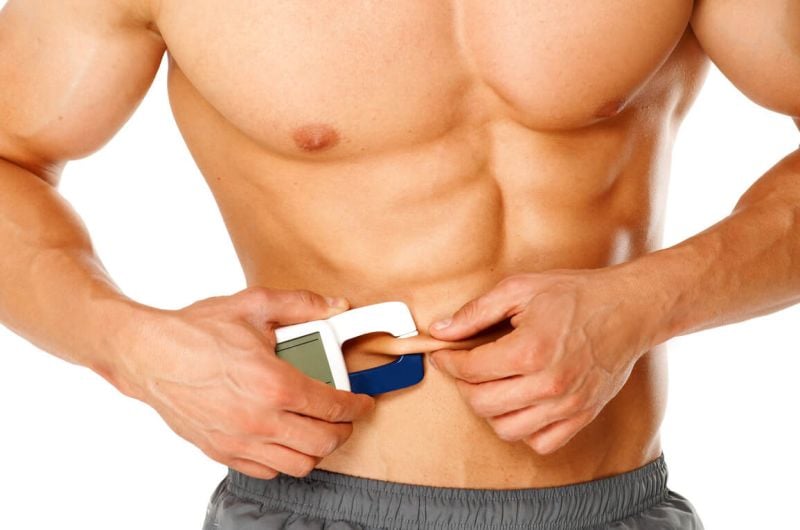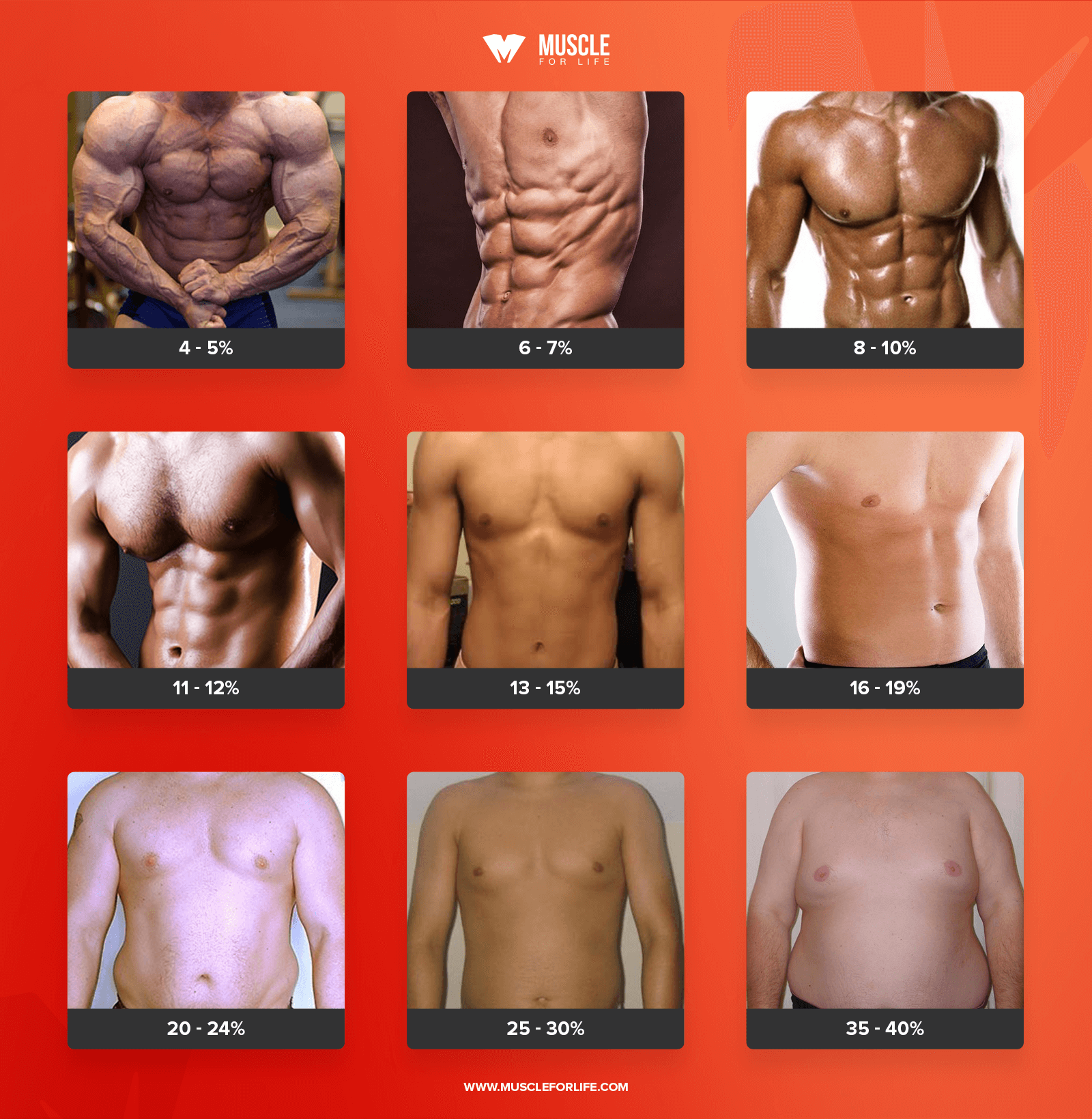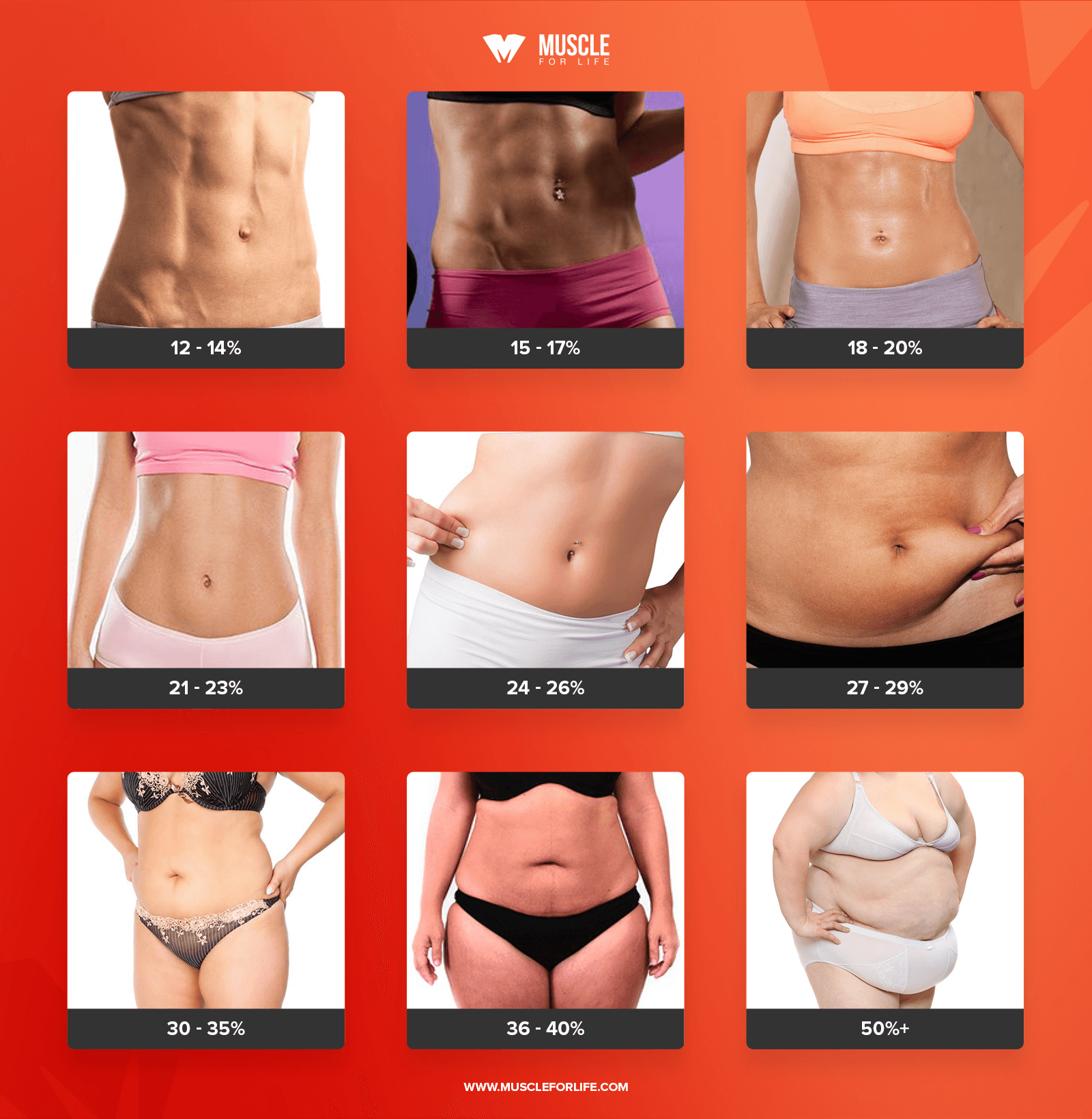Everyone talks about wanting to get “shredded” these days, but they don’t realize it’s actually a curse.
You see, once you’ve been really lean, anything else is just unacceptable. It becomes the new norm.
From that point on, you can’t help but view anything fatter as, well, fat.
Hence, many people that were once fixated on having very low levels of body fat are now fixated on maintaining that level of leanness.
An argument could certainly be made that such a preoccupation with body fatness in general is mentally unhealthy, but there’s definitely a gray area here.
Some people see dedication and drive and others see neurotic obsession. Who’s ultimately right really depends on the individual circumstances.
There’s also something to be said for the mental and emotional liberation that comes with being lean.
When you’re truly content with your body, you no longer have to spend so much time thinking about it.
Because let’s face it–when we feel we’re too fat or skinny fat or whatever, it’s like a toothache–it never really goes away.
Sure, we can shirk or suppress it with rationalization or other forms of mental gymnastics, but it never really leaves our orbits. Its shadow always looms.
Well, imagine if that itch never had to be scratched again.
Imagine if you never again had to expend energy doubting, worrying about, or second-guessing your choices about what and how to eat.
Imagine if you never again felt guilty for breaking your dietary promises you made to yourself.
And imagine the ultimate payoff: the freedom to use that attention and energy on more positive, meaningful things.
Well, there are two ways of achieving this fitness nirvana:
- Overcome your desire to be lean and muscular and find satisfaction in your current state.
- Get lean and muscular.
Personally, I think number two is not only easier but psychologically healthier.
At any rate, that’s not what we’re going to talk about in this article.
Instead, we’re going to focus on the physical ramifications of various body fat levels.
Specifically, we’re going to answer a simple question:
What body fat percentages are healthy and unhealthy?
So, now that we have our marching orders, let’s get moving.
Want to listen to more stuff like this? Check out my podcast!
What Is Body Fat Percentage?
Your body fat percentage is the percentage of your weight that is fat.
For example, if you weigh 150 pounds and have 15 pounds of fat, your body fat percentage is 10% (15 / 150).
Your body fat percentage changes as your body composition changes.
That means it changes when you gain fat, of course, but it also changes when you gain muscle.
For example, let’s say you’re starting my Bigger Leaner Stronger program at the numbers given above–150 pounds and 10% body fat.
You eat right and train hard and gain 15 pounds of muscle and 5 pounds of fat, putting you at 170 pounds with 20 pounds of fat.
Well, your total fat mass has now increased by 33% (15 to 20 pounds) but your body fat percentage has only gone up by 2%, to about 12%.
If you then stopped lifting for a year and lost, let’s say, 10 pounds of the muscle you gained but no fat, your body fat percentage would still be about 12% (20/160), but you’d look quite a bit flabbier.
So, the point is your body fat percentage ebbs and flows as you gain and lose muscle and fat.


How Do You Determine Your Body Fat Percentage?

There are quite a few ways of calculating your body fat percentage and they can vary quite a bit in terms of reliability and accuracy.
For example…
- Body composition scales and handheld devices are notoriously inconsistent and inaccurate.
- Most skinfold testing methods aren’t much better as they’re prone to technical error and faulty equations.
- Even the vaunted DEXA scan can be off by as much as any other method.
Fortunately, you can accurately estimate your body fat percentage…if you know what you’re doing.
Check out this article to learn more.
What Happens as You Lose Body Fat?

You look better, duh. 🙂
Aside from that, though, there’s actually quite a bit that happens in your body as you get leaner.
You sleep better, your body responds to food and exercise better, your risk of disease generally decreases, your quality of life improves, and the list goes on.
Basically, just about everything physiological that matters works better when you’re lean.
Take leanness too far, though, and it becomes detrimental.
If your body fat levels get too low, the list of potential negative health consequences is long, and it includes…
- Hair loss
- Dental and gum problems
- Low blood pressure
- Bradycardia
- Menstrual dysfunction
- Hypogonadism
- Hypoglycemia
- Constipation
- Muscle cramps
- Fatigue
- Mood swings
- Poor concentration
The reason your body fat levels have such a profound effect on your health and well-being is fat is much more than ugly, oily flesh.
It plays many vital roles in the body, including protecting organs from damage, maintaining body temperature, producing hormones and other chemicals, and much more.
Some of these vital hormones and chemicals that require healthy levels of body fat include…
- Aromatase
This is an enzyme that’s involved in sex hormone metabolism.
- TNF alpha and IL-6
These are proteins that are especially important to the immune system.
This is a hormone that primarily relates to the regulation of body weight.
- Angiotensin
This is a hormone involved in blood pressure control.
- Lipoprotein lipase
This is an enzyme that’s involved in the storage and metabolism of fat to release energy.
If body fat levels get too low, production of these chemicals (and many others) becomes compromised, which in turn compromises your health.
The bottom line is there’s a point where looking great and being healthy diverge.
And once that happens, the only way to restore what you’ve lost is to gain some of the fat you’ve lost back.
What’s a Healthy Body Fat Percentage for Men?

If you’ve been kicking around the fitness space for any period of time, you’ve probably heard a lot of opinions on this subject.
Ignorance and jealousy abound, so the general trend is to denounce low body fat levels as unhealthy and irresponsible.
These fears are overweighted.
The reality is the negative effects associated with low body fat levels in men come into play at very low levels–about 5% body fat, to be exact.
And just to put that in perspective, here’s what 5% looks like compared to higher levels of body fat:

As you can see, 5% is competition-ready, shredded to the bone.
It’s the type of physique that bodybuilders and fitness competitors bring to the stage (and that requires copious amounts of drugs). And even they can’t maintain it for long before the serious problems begin.
Fortunately, the type of physique that most guys want falls in the 7 to 9% range, which can be obtained naturally and maintained healthily.
I should know because I’ve kept my body fat percentage around 8% for over a year now and have experienced no negative side effects and have more or less perfect health.
So, the point is this:
If you’re a guy and your goal is to look lean, athletic, and muscular, you have nothing to worry about.
Diet and training is all you need (and a few supplements can help, too).
What’s a Healthy Body Fat Percentage for Women?

Many people think that low body fat levels are unhealthy in men but extremely unhealthy in women.
Again, you can chalk this up mostly to ignorance and/or jealousy.
Negative effects associated with low body fat levels in women become pronounced around 12% body fat.
And just so you can see how lean that really is for a woman:

I’ve worked with thousands of women and I’ve yet to meet one that says she wants to be 12% (outside of competitions at least).
Instead, and like men, most women have their sights set on something much more achievable and sustainable (18 to 20% for most).
And that doesn’t require drugs or starvation dieting or anything other than sensible dieting and exercise.
Now, a discussion of female body fat levels and health isn’t complete without addressing concerns related to hormone levels and menstruation.
Many women believe that getting too lean will inevitably cause major hormonal disruptions that can lead to amenorrhea (losing your period).
Well, it’s not that simple.
Having low body fat levels is associated with low levels of the hormone leptin, which can certainly influence menstruation (and especially if body fat levels get too low).
What has puzzled scientists, though, is the fact that for every lean female athlete afflicted with amenorrhea, you can find one that’s just as lean with normal, regular periods. Furthermore, female athletes also often lose their periods at very different body fat levels.
It was clear that there was more to this story than just body fat percentage.
Well, the cogs of science kept turning and eventually an answer was found: energy balance.
Energy balance refers to the relationship between the amount of energy you eat and the amount you burn.
Think of it like your body’s energy checking account.
- If you eat more energy than you burn, you’re in a state of positive energy balance (calorie surplus).
If you keep your body in a calorie surplus, you’ll gain weight.
- If you eat less than you burn, you’re in a state of negative energy balance (calorie deficit).
If you keep your body in a calorie deficit, you’ll lose weight.
You see, many things happen in the body as well when you under- and over-feed it, and some of them relate to menstruation.
That’s why studies show that energy balance influences menstruation more than body fat levels.
Specifically, when a woman eats less energy than she burns, she can lose her period. And the greater the difference between intake and expenditure, the more frequent the menstrual disturbances can be.
This is why amenorrhea is most common among female athletes participating in sports or physical activities that emphasize low body weight and leanness, such as ballet, gymnastics, endurance running, and swimming.
In most cases, it simply comes down to training too hard and eating too little (which is why many women working their little butts off to lose weight lose their periods as well).
This is also why periods often return in such athletes when energy intake is sufficiently increased and/or energy expenditure is sufficiently decreased.
So, if you lose your period while dieting to lose fat, it doesn’t necessarily mean you’re too lean. It probably means you’re just being too aggressive with your calorie deficit and need to close that gap a bit.
I should also note that high levels of stress can contribute to the reproductive problems as well.
This is one of the many reasons you should make proper relaxation a priority in your life (and especially when you’re dieting!).
Lastly, I’ve also seen women struggle with irregular periods after reaching their desired level of leanness but failing to subsequently increase their caloric intake (reverse diet).
Instead, they stuck to their calorie-restricted diets, usually because they were afraid that eating more would cause them to gain back weight they lost.
Well, it won’t…if you know what you’re doing. Check out this article to learn more.
The Bottom Line on Healthy Body Fat Percentages

Stop listening to fat people who say it’s unhealthy to be lean.
It’s unhealthy to be extremely lean, but such low levels of body fat are almost impossible to reach naturally (and simply aren’t desired by most people).
More salient is the fact that it’s unhealthy to chronically undereat and overtrain, regardless of your body fat percentage.
So, get lean, eat right, train hard, make recovery and health a priority, and you can’t lose.
Good luck!
What’s your take on healthy body fat percentages? Have anything else to share? Let me know in the comments below!
+ Scientific References
- Pauli SA, Berga SL. Athletic amenorrhea: Energy deficit or psychogenic challenge. In: Annals of the New York Academy of Sciences. Vol 1205. Blackwell Publishing Inc.; 2010:33-38. doi:10.1111/j.1749-6632.2010.05663.x
- Nattiv A, Loucks AB, Manore MM, Sanborn CF, Sundgot-Borgen J, Warren MP. The female athlete triad. Med Sci Sports Exerc. 2007;39(10):1867-1882. doi:10.1249/mss.0b013e318149f111
- Nazem TG, Ackerman KE. The Female Athlete Triad. Sports Health. 2012;4(4):302-311. doi:10.1177/1941738112439685
- Williams NI, Leidy HJ, Hill BR, Lieberman JL, Legro RS, De Souza MJ. Magnitude of daily energy deficit predicts frequency but not severity of menstrual disturbances associated with exercise and caloric restriction. Am J Physiol - Endocrinol Metab. 2015;308(1):E29-E39. doi:10.1152/ajpendo.00386.2013
- Nattiv A, Loucks AB, Manore MM, Sanborn CF, Sundgot-Borgen J, Warren MP. The female athlete triad. Med Sci Sports Exerc. 2007;39(10):1867-1882. doi:10.1249/mss.0b013e318149f111
- Ackerman KE, Slusarz K, Guereca G, et al. Higher ghrelin and lower leptin secretion are associated with lower LH secretion in young amenorrheic athletes compared with eumenorrheic athletes and controls. Am J Physiol - Endocrinol Metab. 2012;302(7). doi:10.1152/ajpendo.00598.2011
- Rossow LM, Fukuda DH, Fahs CA, Loenneke JP, Stout JR. Natural bodybuilding competition preparation and recovery: A 12-month case study. Int J Sports Physiol Perform. 2013;8(5):582-592. doi:10.1123/ijspp.8.5.582
- Sundgot-Borgen J, Meyer NL, Lohman TG, et al. How to minimise the health risks to athletes who compete in weight-sensitive sports review and position statement on behalf of the Ad Hoc Research Working Group on Body Composition, Health and Performance, under the auspices of the IOC Medical Commission. Br J Sports Med. 2013;47(16):1012-1022. doi:10.1136/bjsports-2013-092966
- H Wild S, Byrne CD. Body mass index and mortality: Understanding the patterns and paradoxesi2433. BMJ. 2016;353. doi:10.1136/bmj.i2433
- Rossow LM, Fukuda DH, Fahs CA, Loenneke JP, Stout JR. Natural bodybuilding competition preparation and recovery: A 12-month case study. Int J Sports Physiol Perform. 2013;8(5):582-592. doi:10.1123/ijspp.8.5.582
- Evans EM, Saunders MJ, Spano MA, Arngrimsson SA, Lewis RD, Cureton KJ. Body-composition changes with diet and exercise in obese women: A comparison of estimates from clinical methods and a 4-component model. Am J Clin Nutr. 1999;70(1):5-12. doi:10.1093/ajcn/70.1.5
- Van Marken Lichtenbelt WD, Hartgens F, Vollaard NBJ, Ebbing S, Kuipers H. Body Composition Changes in Bodybuilders: A Method Comparison. Med Sci Sports Exerc. 2004;36(3):490-497. doi:10.1249/01.MSS.0000117159.70295.73
- Bosy-Westphal A, Later W, Hitze B, et al. Accuracy of bioelectrical impedance consumer devices for measurement of body composition in comparison to whole body magnetic resonance imaging and dual X-ray absorptiometry. Obes Facts. 2008;1(6):319-324. doi:10.1159/000176061









